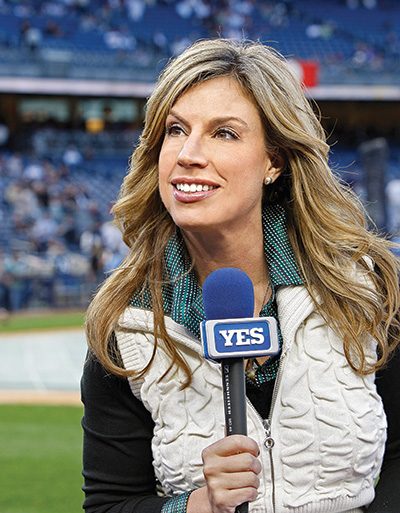
Even when, or especially when, former Yankees catcher Jorge Posada would playfully try to rattle her pre-game routine by firing baseballs near her, Kim Jones enjoyed her job as clubhouse reporter for Yankees’ telecasts on the YES Network. Jones, a native of Pennsylvania and a resident of Bergen County, spent seven years covering the Yanks for YES. Now she is about to tackle a new challenge as a reporter for the NFL Network. A former sports writer for the Star-Ledger, Jones, 42, will be based in New York but will cover the entire NFL. She will continue as an occasional host for WFAN, the sports-talk radio station.
How did you get started as a sports journalist?
I was—I am—a big Georgetown basketball fan. Those were the games we got; you know how TV was back then. I would watch games in my room, and I would sit and write about them. On Thursdays, I’d run to the mailbox, because, sometimes, we got Sports Illustrated on Thursdays. I was in sixth or seventh grade. My dream was always to write for S.I.
You are returning to football, which you covered at Penn State for the local Centre Daily Times. Later, you covered the Giants for the Star-Ledger. How did your YES experience prepare you for this transition?
I learned how to do live television. There’s no way to replicate it. I love big moments, and when you cover the Yankees, there are a lot of them. This might sound corny, but I truly feel that adrenaline rush. I, in no way, thought I was part of a World Series championship. I don’t think I’m part of 3,000 hits, or part of being the greatest closer ever. But to be in those moments, in the capacity I was, is something I could never replicate.
Where do you think you will be spending most of your time this season?
With the Giants being world champs, and the Jets acquiring Tim Tebow, I think it’s safe to say I’ll be doing a lot of my work locally, which is fine with me. And I won’t be with the same team every day, which is different. I’ve really enjoyed getting to know people and being around the personalities. But I enjoy the idea of jumping around a little bit, being in different cities and with different teams, where you’re going to have a little more variety.
Is it lonely being one of only a few females in a male-dominated world?
It’s a great opportunity, because if you’re the only female, they’re probably going to know your name. They’re certainly going to know where you’re going to be in the clubhouse or locker room, and you’re going to get a chance to make some sort of an impression. It’s up to you to decide if it’s going to be a good one or a bad one.
What was it like reporting for WFAN last fall on the child-abuse scandal at Penn State, your alma mater?
The most difficult thing was one of my bi-annual sinus infections hit that week, and my voice was giving out on me all the time. So I sounded a whole lot more emotional than I was. I [actually felt] more angry, more distressed, more, “How could this have happened?” than I was emotional. Covering that changed my life. It reminded me that I do want to be a reporter. I think that played a big role in leading to me making a career change. I was out in the field. I was going by what I saw, what I was told, and what I felt in my gut. I was able to have a voice.
What do you like about doing sports talk radio?
Freedom! I’ve just learned to be very free with it. I love the interaction with callers. I love to hear what’s on their minds. Sometimes, they take a different view, in terms of disagreeing, but the magnitude of importance is so different to them, because they are the die-hard fans. They are more emotionally invested.
